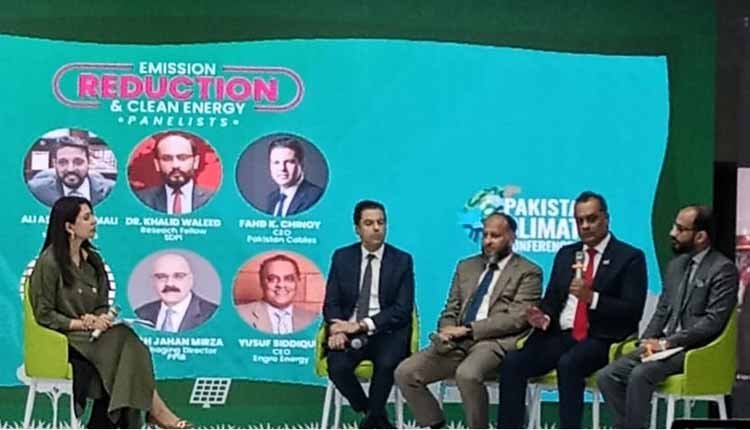OICCI Calls for Collaborative Efforts in Combating Climate Crisis at Pakistan Climate Conference 2023
Karachi: During the 2nd Pakistan Climate Conference on November 1, Amir Paracha, President of OICCI, emphasized the pressing need for action on climate change in Pakistan. He pointed out that climate change is no longer a concern for future generations; it is a current reality in Pakistan.
This marks the second consecutive year that OICCI has organized the Climate Conference with the objective of advancing climate action in the country. Despite Pakistan being responsible for less than 1% of global greenhouse gas emissions, it is the eighth most vulnerable nation to the climate crisis.
Caretaker Finance Minister Shamshad Akhtar, addressing the conference, highlighted that addressing climate-related challenges in Pakistan would require a significant investment of approximately $340 billion, equivalent to 10% of cumulative GDP. One of the major challenges lies in finding a balance between climate finance and development finance.
Minister Shamshad Akhtar pointed out that securing funding for Pakistan’s climate crisis should not compromise other development financing initiatives. She noted that, for the first time, the Ministry of Finance is partnering with the Ministry of Climate and will attend COP28 together in November, exploring innovative climate finance mechanisms.
Minister of Energy Muhammad Ali stressed that the cost of climate change to Pakistan is substantial and continuously rising as the country grapples with severe economic challenges. He emphasized the need for significant investments in energy asset infrastructure by 2040, with a reliance on the capabilities of the private sector, particularly OICCI, which comprises advanced global organizations with the expertise to contribute to Pakistan’s climate future.
Philip Skinner, Managing Director of GuarantCo, underlined the importance of incorporating climate considerations into the decision-making processes of all financial institutions, blurring the distinction between ‘finance’ and ‘climate finance.’
Last year’s devastating floods, affecting one-third of the country, served as a stark reminder of the high price Pakistan pays for climate change, impacting lives and causing destruction. The Pakistan Climate Conference 2023 convened global and local climate change experts, business leaders, policymakers, and social activists to collaborate in mitigating climate change impacts.
Amir Paracha, in his opening remarks, highlighted the collective effort of over 200 multinational corporations in Pakistan, expressing a sense of responsibility and accountability in minimizing environmental footprints. OICCI aims to implement changes within its own operations and engage with other stakeholders in the ecosystem.
The Conference’s themes align with the upcoming COP28, including Climate Resilience and Capacity Building in Vulnerable Communities, Plastic and Waste Management, and Emissions Reduction and Green Energy.
Speaking about the significance of climate change discourse, OICCI Secretary General M Abdul Aleem emphasized the importance of initiatives, projects, and campaigns aimed at addressing the climate crisis through collective efforts.
The 2nd Pakistan Climate Conference 2023 built upon the foundation laid in the first PCC, offering policy directions and sharing best practices from leading MNCs in Pakistan to accelerate the nation’s climate-positive journey.
Rehan Shaikh, Vice President of OICCI, stressed the importance of aligning policies and investments with a net-zero future, in line with the goals of the Paris Agreement, to mobilize more resources and support for Pakistan’s development.
The conference featured prominent speakers, including Dr. Shamshad Akhtar, Minister of Finance, Muhammad Ali, Minister of Energy, Adil Najam, WWF Global President, Bill Winters, Global CEO of Standard Chartered Bank, Philip Skinner, Managing Director of GuarantCo, Sarah Mooney, British Deputy High Commissioner, and other leading business and thought leaders.
The event saw the participation of a diverse audience from the business community, trade bodies, academia, NGOs, and social sector organizations, all commending OICCI for convening global experts to address this critical issue.
OICCI member companies, such as Chevron, Dawlance, InfraZamin, Standard Chartered Bank, Unilever, BASF, Toyota Indus Motors, Nestle, and Abbott, played key roles as sponsors of the event.


Comments are closed, but trackbacks and pingbacks are open.